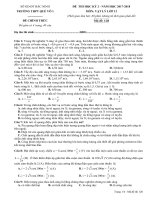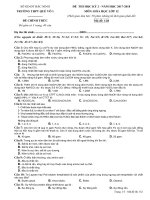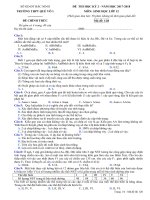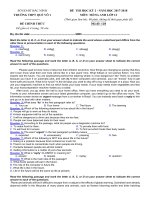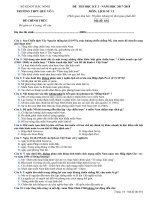Đề KSCL Tiếng Anh 12 lần 3 năm 2020 – 2021 trường THPT Quế Võ 1 – Bắc Ninh
Bạn đang xem bản rút gọn của tài liệu. Xem và tải ngay bản đầy đủ của tài liệu tại đây (257.18 KB, 8 trang )
<span class='text_page_counter'>(1)</span><div class='page_container' data-page=1>
<b>SỞ GD-ĐT BẮC NINH </b>
<b>TRƯỜNG THPT QUẾ VÕ 1 </b>
<b></b>
<b>---ĐỀ KHẢO SÁT CHẤT LƯỢNG LẦN 3 - NĂM HỌC 2020-2021 </b>
<b>BÀI THI MÔN: TIẾNG ANH 12 </b>
<i>(Thời gian làm bài: 60 phút, không kể thời gian phát đề) </i>
<b>ĐỀ CHÍNH THỨC </b>
<i>Đề gồm có 6 trang, 50 câu </i>
<b>Mã đề: 101 </b>
<i>(Thí sinh khơng được sử dụng tài liệu)</i>
<b>Họ tên thí sinh:...SBD:... </b>
<i><b>Mark the letter A, B, C, D on your answer sheet to indicate the word whose underlined part differs </b></i>
<i><b>from the other three in each of the following question. </b></i>
<b>Câu 1: A. </b>mounting <b>B. </b>account <b>C. </b>astound <b>D. </b>country
<b>Câu 2: A. </b>documents <b>B. </b>definitions <b>C. </b>combs <b>D. </b>doors
<i><b>Mark the letter A, B, C, D on your answer sheet to indicate the word that differs from the other </b></i>
<i><b>three in the position of primary stress in each of the following question. </b></i>
<b>Câu 3: A. </b>stimulate <b>B. </b>determine <b>C. </b>devastate <b>D. </b>sacrifice
<b>Câu 4: A. </b>mature <b>B. </b>nature <b>C. </b>vulture <b>D. </b>culture
<i><b>Mark the letter A, B, C, D on your answer sheet to indicate the correct answer to each of the </b></i>
<i><b>following questions. </b></i>
<b>Câu 5:</b> By the time Ryan finally graduated from high school, he ________five different schools
because his parents moved frequently.
<b>A. </b>was attending <b>B. </b>attended <b>C. </b>has been attending <b>D. </b>had attended
<b>Câu 6:</b> George wouldn’t have met Mary______ to his brother’s graduation party.
<b>A. </b>if he shouldn’t have gone <b>B. </b>had he not gone
<b>C. </b>if he has not gone <b>D. </b>had not he gone
<b>Câu 7:</b> They had their baby daughter in June and, since then, they __ in restaurants very
often.
<b>A. </b>couldn’t eat <b>B. </b>haven’t been able to eat <b>C. </b>weren’t able to eat <b>D. </b>didn’t use to eat
<b>Câu 8:</b> The interviews with parents showed that the vast majority were ________of teachers.
<b>A. </b>supporter <b>B. </b>Supporting <b>C. </b>support <b>D. </b>supportive
<b>Câu 9:</b> Richard _____ a bad cold the day before his exam.
<b>A. </b>came up with <b>B. </b>came round <b>C. </b>came down with <b>D. </b>came across
<b>Câu 10:</b> There has been little rain in this region for several months, ______?
<b>A. </b>hasn’t it <b>B. </b>has there <b>C. </b>has it <b>D. </b>hasn’t there
<b>Câu 11:</b> He arrived ____ than anyone else, so he had to wait more than an hour.
<b>A. </b>early <b>B. </b>earlier <b>C. </b>earliest <b>D. </b>more early
<b>Câu 12:</b> I’ve got a very high opinion ________ your brother.
<b>A. </b>for <b>B. </b>to <b>C. </b>on <b>D. </b>of
<b>Câu 13:</b> We were all in___________of the fact that the new manager was our old friend Duncan.
<b>A. </b>amazement <b>B. </b>shock <b>C. </b>awe <b>D. </b>surprise
<b>Câu 14:</b> When about their preferences for movies, many young people say that they are in
favour of science fiction.
<b>A. </b>asked <b>B. </b>asking <b>C. </b>having asked <b>D. </b>are asked
<b>Câu 15:</b> Left - hand traffic, a custom existing in Britain only, back to the days when English
people went to and fro on horseback.
</div>
<span class='text_page_counter'>(2)</span><div class='page_container' data-page=2>
<b>Câu 16:</b> I don’t like of these two restaurants. I prefer another one.
<b>A. </b>one <b>B. </b>neither <b>C. </b>either <b>D. </b>any
<b>Câu 17:</b> She was also from school, after teachers said she would be a ‘bad influence’ on the
other girls.
<b>A. </b>excluded <b>B. </b>expelled <b>C. </b>extracted <b>D. </b>exiled
<b>Câu 18:</b> Jimmy’s low examination scores kept him from<b>_______ </b>to the university
<b>A. </b>to admit <b>B. </b>admitting <b>C. </b>to be admitted <b>D. </b>being admitted
<b>Câu 19:</b> I had a ______ chat with my manager and gave him an update on the project.
<b>A. </b>lull <b>B. </b>short <b>C. </b>brief <b>D. </b>quick
<i><b>Mark the letter A, B, C, or D on your answer sheet to indicate the word(s) CLOSEST in meaning </b></i>
<i><b>to the underlined word(s) in each of the following questions. </b></i>
<b>Câu 20:</b> All the students were <b>all ears </b>when the teacher started talking about the changes in the next
exam.
<b>A. </b>silent <b>B. </b>smiling <b>C. </b>restless <b>D. </b>attentive
<b>Câu 21:</b> The doctor is busy right now, but he could probably <b>fit you in</b> later.
<b>A. </b>find time to see you <b>B. </b>try to cure your illness
<b>C. </b>look after you <b>D. </b>examine your health problem
<i><b>Mark the letter A, B, C, or D on your answer sheet to indicate the word(s) OPPOSITE in </b></i>
<i><b>meaning to the underlined word(s) in each of the following questions. </b></i>
<b>Câu 22:</b> Mr Lane urged any parents who have concerns about the disease to seek medical help <b>at </b>
<b>once.</b>
<b>A. </b>immediately <b>B. </b>forthwith <b>C. </b>right way <b>D. </b>in due course
<b>Câu 23:</b> Overpopulation in big cities has <b>severely</b> affected the air and water quality.
<b>A. </b>insignificantly <b>B. </b>commonly <b>C. </b>seriously <b>D. </b>largely
<i><b>Mark the letter A, B, C, or D on your answer sheet to indicate the option that best complete each </b></i>
<i><b>of the following exchanges. </b></i>
<b>Câu 24:</b> Jenny: “Hi, Mark. Long time no see. What’s going on?" Mark: “ ”.
<b>A. </b>Good morning. <b>B. </b>I saw you yesterday.
<b>C. </b>I’m going to see a movie <b>D. </b>So-so.
<b>Câu 25:</b> Thanh: "Lan's the best singer in our school".
Nadia: “___________”
<b>A. </b>I can't agree with you more! <b>B. </b>Yes, please.
<b>C. </b>Yes, tell me about it! <b>D. </b>That's OK!
<i><b>Mark the letter A, B, C, or D on your answer sheet to indicate the underlined part that needs </b></i>
<i><b>correction in each of the following questions. </b></i>
<b>Câu 26:</b> The painting was so beautiful that I stood there admired it for a long time.
<b>A. </b>stood <b>B. </b>admired
<b>C. </b>painting was so beatiful <b>D. </b>for a long time
<b>Câu 27:</b> Sleeping, resting, and to drink fruit juice are the best ways to care for a cold.
<b>A. </b>to drink <b>B. </b>Sleeping <b>C. </b>best ways <b>D. </b>juice
<b>Câu 28:</b> Mrs. Mai, along with her friends from Vietnam, are planning to attend the festival.
<b>A. </b>her friends <b>B. </b>to attend <b>C. </b>along with <b>D. </b>are
<i><b>Mark the letter A, B, C, or D on your answer sheet to indicate the sentence that is closest in </b></i>
<i><b>meaning to each of the following questions. </b></i>
</div>
<span class='text_page_counter'>(3)</span><div class='page_container' data-page=3>
<b>C. </b>I find Harold's behavior quite incomprehensible.
<b>D. </b>I have to lose a lot to understand Harold’s behavior.
<b>Câu 30: No one in our club can speak English as fluently as Mai. </b>
<b>A. </b>Mai speaks English more fluently than no one in our club.
<b>B. </b>Mai speaks English the most fluently in our club.
<b>C. </b>Mai speaks English as fluently as other people in our club.
<b>D. </b>Mai is the worst English speaker in our club.
<b>Câu 31: The teacher said to us: “Don’t make so much noise”. </b>
<b>A. </b>The teacher said we didn’t make so much noise.
<b>B. </b>The teacher asked us not to make so much noise.
<b>C. </b>The teacher ordered us if we didn’t make so much noise.
<b>D. </b>The teacher told us that we didn’t make so much noise.
<i><b>Mark the letter A, B, C, or D on your answer sheet to indicate the sentence that best combines </b></i>
<i><b>each pair of sentences in the following questions. </b></i>
<b>Câu 32: She had only just put the telephone down when the boss rang. </b>
<b>A. </b>She had put the telephone down, so she let it ring when the boss rang.
<b>B. </b>The boss rang back, but she put the telephone down.
<b>C. </b>She put the telephone down and the boss rang.
<b>D. </b>Hardly had she put the telephone down when the boss rang.
<b>Câu 33: You have just passed your final examination. This makes your parents happy </b>
<b>A. </b>You have just passed your final examination which it makes your parents happy.
<b>B. </b>Having just passed your final examination making your parents happy.
<b>C. </b>That you have just passed your final examination makes your parents happy.
<b>D. </b>You have just passed your final examination makes your parents happy.
<i><b>Cloze text. </b></i>
<i><b>Reading the following passage and mark the letter on your answer sheet to indicate the correct word </b></i>
<i><b>that best fits each of the numbered blank from 34 to 38 </b></i>
The World Health Organization (WHO) is warning young people all over the world that they are
also at risk from COVID-19. The WHO said young people are not exempt from catching the
coronavirus. Many young people ___ 34 _believe they will not catch the virus because of their age.
They think it is a disease that only older people catch. The WHO said the truth is _______35young
people are catching the coronavirus and becoming ill or dying from it. It added that young people are
also spreading the disease to their parents, grandparents and _____ 36 people. The White House also
urged young adults to follow advice and to avoid gathering in large groups to help prevent the spread
of the virus.
The Director-General of the WHO said: "Today, I have a message for young people: You are
not invincible." He added: "This coronavirus could put you in hospital for weeks, or even kill you.
Even if you don't get sick, the choices you make about where you go could be the difference between
life and death for someone else." The WHO said: "A significant proportion of patients_______37 in
hospital for COVID-19 around the world are aged under 50." New York Governor Andrew Cuomo
said many young people are not ________38 the state's social-distancing rules. He told young people
that: "This is a public health issue and you cannot be endangering other peoples' health."
<i>( Source: </i>
<b>Câu 34: A. </b>really <b>B. </b>frequently <b>C. </b>strongly <b>D. </b>mistakenly
<b>Câu 35: A. </b>why <b>B. </b>what <b>C. </b>that <b>D. </b>when
</div>
<span class='text_page_counter'>(4)</span><div class='page_container' data-page=4>
<i><b>Reading comprehension </b></i>
<i><b>Read the following text and circle the best answer among A, B, C, or D on your answer sheet for the </b></i>
<i><b>questions from 39 to 43 </b></i>
<b>SCIENCE FLYING IN THE FACE OF GRAVITY </b>
It looked just like another aircraft from the outside. The pilot told his young passengers that it was
built in 1964, a Boeing KC-135 refuelling tanker, based on the 707. But appearances were deceptive,
and the 13 students from Europe and the USA who boarded the aircraft were in for the flight of their
lives.
Inside, the area that normally had seats had become a long white tunnel. Heavily padded from floor
to ceiling; it looked a bit like a lunatic asylum. There were almost no windows, but lights along the
padded walls <b>eerily</b> illuminated it. Most of the seats had been taken out apart from a few at the back,
where the young scientists quickly took their places with a look of apprehension.
From 12 months, science students from across the continents had competed to win a place on the
flight at the invitation of the European Space Agency. The challenge had been to suggest imaginative
experiments to be conducted in weightless conditions. For the next two hours the Boeing's flight
resembled that of an enormous bird which had lost its reason, shooting upwards towards the heavens
before hurting towards Earth. The intention was to achieve weightlessness for a few seconds.
The aircraft took off smoothly enough, but any feelings that I and the young scientists had that we
were on anything like a scheduled passenger service were quickly dismissed when the pilot put the
plane into a 45-degree climb which lasted around 20 seconds. Then the engine cut out and we became
weightless. Everything became confused, and left or right, up or down no longer had any meaning.
After 10 seconds of free-fall descent, the pilot pulled the aircraft out of its nosedive. The return of
gravity was less immediate than its loss, but was still sudden enough to ensure that some students came
down with a bump.
After two hours of going up and down in the plane doing experiments, the predominant feeling was
one of exhilaration rather than nausea. Most of the students thought <b>it</b> was an unforgettable experience
and one they would be keen to repeat.
<b>Câu 39:</b><i><b> </b>What does the writer say about the plane? </i>
<b>A. </b>The outside was misleading <b>B. </b>The inside was painted white.
<b>C. </b>It had no seats. <b>D. </b>It had no windows.
<b>Câu 40:</b><i><b> </b>What does the word <b>eerily</b> in paragraph 2 mean? </i>
<b>A. </b>brightly <b>B. </b>clearly <b>C. </b>strangely <b>D. </b>badly
<b>Câu 41:</b><i><b> </b>What did the pilot do with the plane? </i>
<b>A. </b>He quickly climbed and stopped the engines.
<b>B. </b>He climbed and made the plane turn over.
<b>C. </b>He climbed and made the plane fall slowly.
<b>D. </b>He took off normally and then cut the engines for 20 seconds.
<b>Câu 42</b><i><b>:</b> Why was this passage written? </i>
<b>A. </b>To describe the outcome of a scientific competition.
<b>B. </b>To encourage young people to take up science.
<b>C. </b>To show scientists what young people can do.
<b>D. </b>To report on a new scientific technique.
<b>Câu 43:</b> <i>What does the word <b>it</b> in the last paragraph refer to? </i>
</div>
<span class='text_page_counter'>(5)</span><div class='page_container' data-page=5>
<i><b>Read the following text and circle the best answer among A, B, C, or D on your answer sheet for the </b></i>
<i><b>questions from 44 to 50 </b></i>
TV has transformed politics in the USA by changing the way in which information is <b>disseminated, </b>
by altering political campaigns, and by changing citizen’s patterns of response to politics. By giving
citizens independent access to the candidates, television diminished the role of the political party in the
selection of the major party candidates. By centering politics on the person of the candidate, television
accelerated the citizen’s focus on character rather than issues.
TV has altered the forms of political communication as well. The messages on which most of us
rely are briefer than they once were. The <b>stump speech, </b>a political speech given by traveling
politicians and lasting 1/2 to 2 hours, which characterized nineteenth-century political discourse, has
given way to the 30-second advertisement and the 10 second "sound bite" in broadcast news.
Increasingly the audience for speeches is not <b>that </b>standing in front of the politician but rather the
viewing audience who will hear and see a snippet of the speech on the news.
In these abbreviated forms, much of what constituted the traditional political discourse of earlier
ages has been lost. In 15 or 30 seconds, a speaker cannot establish the historical context that shaped the
issue in question, cannot detail the probable causes of the problem, and cannot examine alternative
proposals to argue that one is preferable to others. In snippets, politicians assert but do not argue.
Because television is an intimate medium, speaking through it require a changed political style that
was more conversational, personal, and visual than that of the old-style stump speech. Reliance on
television means that increasingly our political world contains memorable pictures rather than
memorable words. Schools teach us to analyze words and print. However, in a word in which politics
is increasingly visual, informed citizenship requires a new set of skills.
Recognizing the power of television’s pictures, politicians craft televisual, staged events, called
pseudo-event, designed to attract media coverage. Much of the political activity we see on television
news has been crafted by politicians, their speechwriters, and their public relations advisers for
televised consumption. Sound bites in news and answers to questions in debates increasingly sound
like advertisements.
<b>Câu 44:</b> <i>According to the passage, as compared with televised speeches, traditional political </i>
<i>discourse was more successful at ________. </i>
<b>A. </b>making politics seem more intimate to citizens
<b>B. </b>providing detailed information about a candidates private behavior
<b>C. </b>placing political issues within a historical context
<b>D. </b>allowing news coverage of political candidates
<b>Câu 45:</b> <i>The word <b>"that" </b>in paragraph 2 refers to ________.</i>
<b>A. </b>advertisement <b>B. </b>broadcast news <b>C. </b>politician <b>D. </b>audience
<b>Câu 46:</b> <i>The author mentions the <b>"stump speech" </b>in paragraph 2 as an example of ________. </i>
<b>A. </b>a style of speech common to televised political events
<b>B. </b>an interactive discussion between two politicians
<b>C. </b>a kind of political presentation typical of the nineteenth century
<b>D. </b>an event created by politicians to attract media attention
<b>Câu 47:</b> <i>It can be inferred that before the introduction of television, political parties ________. </i>
<b>A. </b>spent more money to promote their political candidates
<b>B. </b>had more influence over the selection of political candidates
<b>C. </b>attracted more members
<b>D. </b>received more money
<b>Câu 48:</b> <i>The word <b>"disseminated" </b>in paragraph 1 is closest in meaning to ________. </i>
<b>A. </b>spread <b>B. </b>analyzed <b>C. </b>stored <b>D. </b>discussed
<b>Câu 49:</b> <i>What is the main point of the passage? </i>
</div>
<span class='text_page_counter'>(6)</span><div class='page_container' data-page=6>
<b>B. </b>Citizens in the United States are now more informed about political issues because of television
coverage.
<b>C. </b>Politics in the United States has been significantly changed by television.
<b>D. </b>Politics in the United States has become substantially more controversial since the introduction
of television.
<b>Câu 50:</b> <i>According to paragraph 5, staged political events are created so that politicians can ______.</i>
<b>A. </b>obtain more television coverage for themselves
<b>B. </b>create more time to discuss political issues
<b>C. </b>spend more time talking to citizens in person
<b>D. </b>engages in debates with their opponents
---
</div>
<span class='text_page_counter'>(7)</span><div class='page_container' data-page=7>
mamon made Cautron dapan
ANH 12 101 1 D
ANH 12 101 2 A
ANH 12 101 3 B
ANH 12 101 4 A
ANH 12 101 5 D
ANH 12 101 6 B
ANH 12 101 7 B
ANH 12 101 8 D
ANH 12 101 9 C
ANH 12 101 10 B
ANH 12 101 11 B
ANH 12 101 12 D
ANH 12 101 13 C
ANH 12 101 14 A
ANH 12 101 15 C
ANH 12 101 16 C
ANH 12 101 17 B
ANH 12 101 18 D
ANH 12 101 19 C
ANH 12 101 20 D
ANH 12 101 21 A
ANH 12 101 22 D
ANH 12 101 23 A
ANH 12 101 24 D
ANH 12 101 25 A
ANH 12 101 26 B
ANH 12 101 27 A
ANH 12 101 28 D
ANH 12 101 29 C
ANH 12 101 30 B
ANH 12 101 31 B
ANH 12 101 32 D
ANH 12 101 33 C
ANH 12 101 34 D
ANH 12 101 35 C
ANH 12 101 36 C
ANH 12 101 37 B
ANH 12 101 38 B
ANH 12 101 39 A
ANH 12 101 40 C
ANH 12 101 41 A
ANH 12 101 42 A
ANH 12 101 43 D
ANH 12 101 44 C
ANH 12 101 45 D
</div>
<span class='text_page_counter'>(8)</span><div class='page_container' data-page=8>
ANH 12 101 47 B
ANH 12 101 48 A
ANH 12 101 49 C
</div>
<!--links-->
de thi kscl mon ngu van lop 11 lan 3 nam 2015 2016 truong thpt que vo 1 bac ninh
- 7
- 198
- 0



